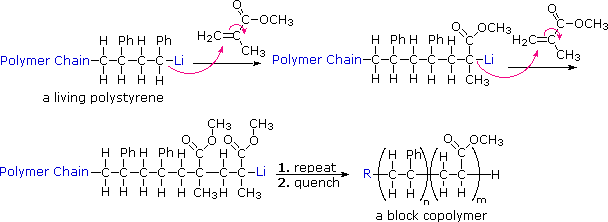Taking Full Advantage Of the Potential of Polymers: Discover the Diverse Benefits and Practical Utilizes
In the large landscape of material science, polymers stick out as functional compounds that have permeated almost every aspect of contemporary life. Their application extends numerous markets, from manufacturing and building and construction to medical care and modern technology. The complex advantages and functional uses polymers proceed to evolve, offering ingenious services to complex difficulties. By exploring just how polymers can improve item sturdiness, drive sustainability efforts, transform medical care solutions, and lead the way for future technological advancements, we can reveal a globe of opportunities waiting to be harnessed.
Significance of Polymers in Modern Industries
Polymers play an essential duty in contemporary sectors, working as flexible materials that drive innovation and performance throughout a large range of markets. These complicated molecules, made up of duplicated subunits, have changed markets such as auto, aerospace, electronics, medical care, and much more. In the vehicle market, polymers have allowed the growth of light-weight yet sturdy parts, enhancing gas effectiveness and total efficiency. Aerospace sectors count on polymers for their high strength-to-weight ratio, important for airplane and spacecraft building. The electronic devices market advantages from the insulating buildings of polymers, essential for manufacturing motherboard and digital gadgets (Polymers). Additionally, polymers are extensively made use of in the medical care sector for drug distribution systems, clinical tools, and biocompatible materials. Their flexibility, resilience, and cost-effectiveness make polymers vital in modern production procedures, fostering innovations and driving progression in numerous markets worldwide. Accepting the possibility of polymers is vital to opening more advancements and resolving the developing demands these days's commercial landscape.
Enhancing Item Longevity With Polymers
With a focus on durability and durability, incorporating advanced polymer innovations right into product design has ended up being a foundation of boosting longevity in contemporary manufacturing processes. Polymers provide a variety of buildings that contribute to the total durability of items. One essential advantage is their resistance to corrosion, chemicals, and weathering, making them excellent for usage in numerous sectors where exposure to extreme problems is usual.
Moreover, polymers can be customized to meet specific sturdiness demands, enabling suppliers to personalize items according to their planned usage and anticipated lifespan. By incorporating polymers into product elements, producers can improve toughness and influence resistance, decreasing the chance of breakage or put on with time.
In addition, polymers are light-weight yet sturdy, providing resilience without including unneeded weight to products. This characteristic is especially advantageous in markets such as aerospace and automobile, where lightweight materials are necessary for enhancing fuel efficiency and overall efficiency.
Sustainability Developments Through Polymer Development
In the world of contemporary manufacturing and item layout, the innovative application of polymers is driving substantial innovations in sustainability methods. Polymer advancement plays a vital function in boosting sustainability by supplying solutions that lower ecological impact across various industries. One key facet where polymers stand out Polymers is in making it possible for the development of light-weight yet durable products that add to fuel effectiveness in transportation and reduce overall energy intake. In addition, the recyclability and biodegradability of specific polymers additionally advertise lasting techniques by minimizing waste and air pollution.
Moreover, advancements in polymer modern technology have caused the development of bio-based and sustainable polymers, originated from natural resources such as plants, that provide a more sustainable alternative to conventional petroleum-based plastics. These green polymers not just help in reducing reliance on nonrenewable fuel sources however likewise lower greenhouse gas emissions during production. By incorporating these ingenious polymers right into producing procedures, companies can decrease their environmental impact and move towards more sustainable practices, aligning with global efforts to combat climate change and advertise a round economic situation.
Polymers in Medical Care: Revolutionizing Medical Solutions

One of the key areas where polymers are making substantial strides remains in the advancement of targeted medication shipment systems. By encapsulating medications within polymeric nanoparticles or micelles, researchers can boost medicine security, enhance bioavailability, and allow controlled release, leading to extra efficient treatment regimens with lowered side results.
Additionally, polymers contribute in the field of regenerative medicine, where special info they are made use of to develop scaffolds that simulate the extracellular matrix, supplying support for cell growth and cells regeneration. This technology holds tremendous assurance for fixing harmed organs, advertising injury healing, and advancing tailored medicine approaches.
In significance, the combination of polymers in health care is driving innovation, improving treatment efficiency, and ultimately improving patient results in means previously believed unattainable.
Future Applications and Innovations in Polymer Innovation
Progressing at the leading edge of clinical exploration, polymer innovation continues to pave the way for groundbreaking applications and developments forming diverse sectors. In the world of lasting packaging, naturally degradable polymers are obtaining traction as eco-friendly choices to traditional plastics. These polymers break down naturally, minimizing the ecological impact of single-use items. Additionally, in the area of electronic devices, conductive polymers are revolutionizing wearable technology and versatile electronics. Their unique properties permit the development of stretchable circuits and sensors, enabling new possibilities in healthcare monitoring and smart clothing. Furthermore, polymer nanocomposites are improving the mechanical and thermal buildings of products, causing more powerful and lighter elements in aerospace and auto industries. Looking ahead, researchers are discovering the possibility of shape-memory polymers for applications in robotics and biomedical tools, where materials that can "keep in mind" and go back to their original forms use interesting possibilities for development. As polymer technology remains to advance, the future holds limitless chances for groundbreaking developments across numerous markets.
Conclusion
